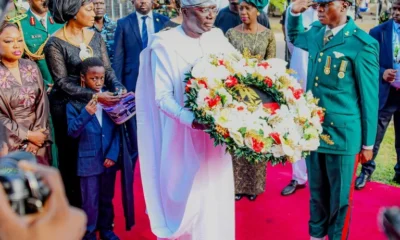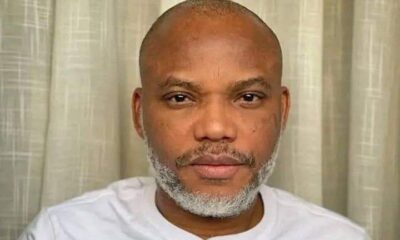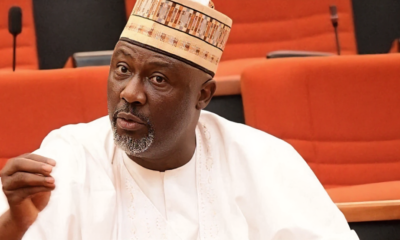Columns
Preventing misuse of the Cybercrimes Act: Protecting free speech, unlocking economic growth

On Democracy Day, the heads of missions of the United States, United Kingdom, Finland, Norway, and Canada would like to recognise and congratulate the Nigerian people’s commitment to 26 years of democratic governance. Healthy democracies are formed of many important ingredients and when marking 25 years of democracy in Nigeria in 2024, President Tinubu underlined that in Nigeria “there must be diverse perspectives and viewpoints.” Free expression has long been a core value of Nigeria’s democracy.
Nigeria’s constitution enshrines the right to freedom of expression, aiming to protect its citizens’ rights and foster a society where people can debate and discuss ideas free from government control.
This right, a principle of trusting ordinary citizens to have discussion in the virtual public square, remains vital today.
In April, Nigeria’s National Human Rights Commission (NHRC) raised concerns about the 2015 Cybercrimes Act, the amendments made to it in 2024, and the law’s impact on free expression. The Act has laudable aims: to combat online fraud and cyberattacks. There is growing evidence, however, that the Act is being misused by some to silence criticism and dissent. The NHRC’s advisory opinion on freedom of expression warned that it “has potentials for abuse, particularly with respect to arrests and prosecutions of activists, journalists, bloggers, and ordinary social media users.” In addition, in 2022 the ECOWAS Court of Justice ruled that the Act is not in conformity with the country’s obligations related to freedom of expression under the African Charter on Human and Peoples’ Rights and the International Covenant on Civil and Political Rights.
Misuse of the Cybercrimes Act undermines democratic advancement and civic participation. It also jeopardizes the confidence of investors and risks deterring the innovation needed for economic growth.
Consider the case of Dele Farotimi, charged with 12 counts of cybercrime after he reported alleged corruption in the judiciary in a book and on a podcast. Farotimi was allegedly detained in Lagos, transported across state lines to Ekiti, and brought to court in handcuffs. Though the charges were eventually withdrawn, his ordeal highlights a troubling issue – the Cybercrimes Act, originally intended to combat online fraud and cyberterrorism, can be misused as a tool to stifle free expression and undermine democratic engagement. Farotimi is not alone. Journalists, activists, and ordinary citizens have faced similar charges for sharing opinions or reporting on alleged corruption. This distortion of the law’s original intent can lead to citizens becoming hesitant to speak out, weakening democratic accountability and potentially fuelling distrust in government.
The Nigeria Communications Commission (NCC) estimates the country loses $500 million per year to cybercrime. This problem requires a response. However, the Cybercrimes Act’s broad language, especially its vague definitions of “false information,” “cyberstalking,” “harassment,” and “insult” leave room for confusion and potential abuse. The law’s broad scope allows it to be misused against Nigerian citizens seeking to express dissent, form opinions, or criticize powerful people. NHRC has called on law enforcement to “exercise caution” in how they interpret the Act’s frequently used Section 24 to make sure that charges reflect an actual threat to public order. We therefore welcome the commitment from Nigeria’s Minister of Information and National Orientation, Mohammed Idris, to collaborate with the National Assembly and relevant stakeholders in reviewing the Cybercrimes Act so that it protects the values enshrined in Nigeria’s constitution.
The implications extend beyond free expression. Nigeria’s economic future depends on its ability to innovate and attract investment in the digital age. However, the Cybercrimes Act’s misapplication, even in a small number of cases, risks detracting the innovators and entrepreneurs the government wants to invest in Nigeria. The Cybercrimes Act also contributes to uncertainty abroad about Nigeria’s legal landscape. Its vague provisions make it difficult for businesses and investors to assess legal risks, hindering investment in industries that rely on digital content. Reform is needed to protect both citizens’ rights and Nigeria’s future.
The undersigned Heads of Mission in Nigeria encourage Nigerian lawmakers to consider reform of the Cybercrimes Act to narrow the definitions of key terms such as “false information,” cyberstalking,” insult,” hatred,” and “harassment,” and ensure those definitions cannot be used erroneously to silence critics and censor expression. As friends of Nigeria who share the country’s strong commitment to democratic values, we want Nigeria to realise its potential as a democratic digital powerhouse. We would therefore welcome the Nigerian government amending the Act to strike a balance between protecting citizens while preserving human rights, including free expression. This will be a difficult balance to strike but is vital for delivering what Nigeria wants: a stable and open democracy, and economic growth underpinned by investment.
Nigeria is not alone in facing this problem. Democracies across the world are grappling with the ever-evolving challenges and opportunities that the digital world presents. Through the Council of Europe’s Global Action on Cybercrime project, Nigerian lawmakers are receiving funding and technical assistance to help the current review of the Act lead to legislation that meets international standards and best practices. However, the deadline for the Act’s review has consistently been delayed, and we urge Nigerian lawmakers to make this review a priority, and ensure it is open to public consultation and debate.
Free expression is a precious commodity that relies on all of us to respect it. It is a fundamental tenant of Nigeria’s constitution. Nigerians, and any citizens of countries around the world, should be able to hold and express their views, even if those opinions are unpopular.
Jointly written by Richard M. Mills, Jr., U.S. Embassy; Richard Montgomery; British High Commission; Sanna Selin, Embassy of Finland, Svein Baera; Embassy of Norway
Pasquale Salvaggio, and Canadian High Commission.
Columns
Important Facts About Adegoke Adelabu – “The Lion of the West” (1915–1958)
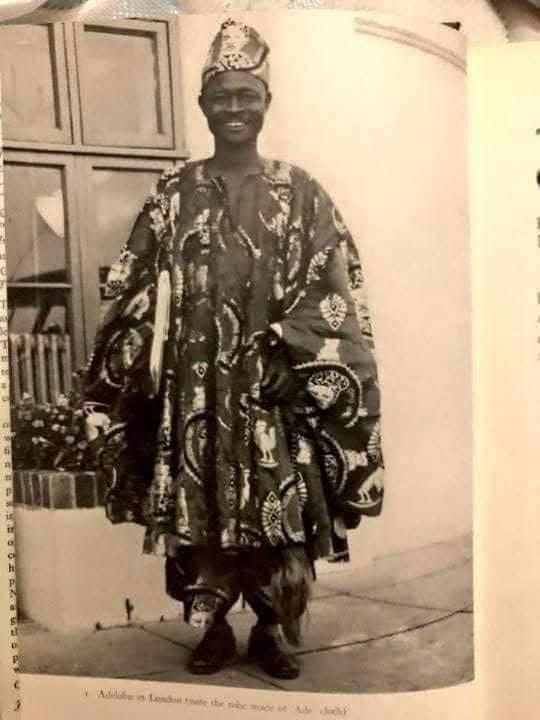
Full Name: Alhaji Adegoke Gbadamosi Adelabu
Birth Name: Gbadamosi Adegoke Akande
Date of Birth: 3 September 1915
Place of Birth: Ibadan, present-day Oyo State, Nigeria
Nickname: “The Lion of the West” — a title earned for his fearless, combative, and charismatic political style
Education:
St. David’s School, Kudeti, Ibadan (1925–1929)
Government College, Ibadan (from 1936)
Yaba Higher College (admitted on scholarship)
Intellectual Reputation:
Adelabu was renowned for his exceptional oratory, sharp intellect, and ideological boldness, making him one of the most formidable politicians of his generation.
Popular Alias:
Known among his largely non-literate supporters as “Penkelesi” — a Yorubanised version of “peculiar mess”, a phrase he frequently used in speeches, which became inseparably associated with him.
Political Affiliation:
A leading member of the National Council of Nigeria and the Cameroons (NCNC) under Dr. Nnamdi Azikiwe during the colonial era.
Political Rivalry:
He was a fierce and ideological opponent of Chief Obafemi Awolowo in the Western Region, making Western Nigerian politics highly competitive and polarized in the 1950s.
Colonial-Era Persecution:
Adelabu is widely regarded as one of the most persecuted opposition politicians of the colonial period, having faced about 18 court cases, many believed to be politically motivated.
Corporate Achievement:
He made history as the first African General Manager of the United Africa Company (UAC), a major British trading firm, marking a significant breakthrough for Africans in colonial corporate leadership.
Death:
Date: 25 March 1958
Place: Ode-Remo, Ijebu Province (present-day Ogun State)
Cause: Fatal motor accident involving his Volkswagen Beetle, alongside a Lebanese business associate and two relatives
Age at Death: 43 years old — two years before Nigeria’s independence
Family:
At the time of his death, Adelabu had 12 wives and 15 children, reflecting the social norms of his era.
Aftermath of Death:
His sudden and tragic death sparked widespread riots and unrest across Ibadan, underscoring his immense popularity and political influence among the masses.
Historical Significance:
Adelabu remains one of the most charismatic, controversial, and intellectually formidable politicians in Nigerian pre-independence history, often remembered as a symbol of radical opposition politics and mass mobilisation.
Source:
Nigerian political history archives
Ibadan colonial-era political records
Biographical accounts on Adegoke Adelabu
Yoruba political history documentation
Columns
Pentecostal Evangel Sparks a Great Revival in Nigeria, 1930s
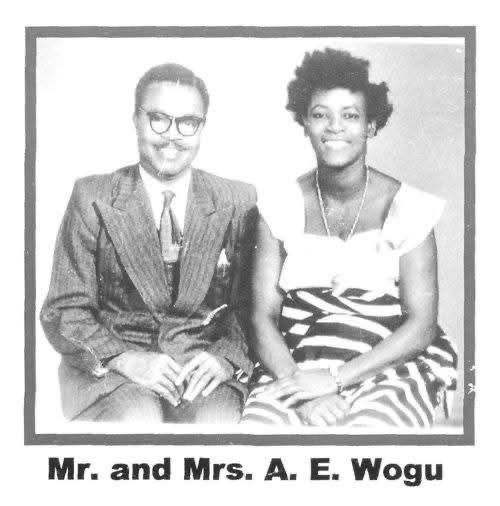
The pioneering role of Mr and Mrs A. E. Wogu in the rise of indigenous Pentecostalism
The explosive growth of Pentecostal Christianity in Nigeria during the twentieth century did not emerge overnight. Long before megachurches, crusade grounds, and global ministries, the movement was shaped by small prayer groups, radical faith, and indigenous leaders who believed that Christianity in Africa must be spiritually vibrant and culturally rooted. Among the most influential of these pioneers were Mr and Mrs Augustus Ehurie Wogu, whose quiet but profound work in Eastern Nigeria helped spark what later became one of the most significant religious revivals in Nigerian history.
By the 1930s, Nigeria was already experiencing religious ferment. Dissatisfaction with mission churches, hunger for spiritual power, and the search for an African-led Christian expression created fertile ground for Pentecostal ideas. It was within this context that the Wogus emerged as key catalysts of renewal.
Augustus Ehurie Wogu: Faith and Public Life
Augustus Ehurie Wogu (A. E. Wogu) was not a cleric by training. He was a respected civil servant, educated and deeply rooted in Christian discipline. Like many early revivalists, his spiritual influence came not from formal ordination but from conviction, prayer, and leadership within lay Christian circles.
At a time when colonial society often separated public service from spiritual enthusiasm, Wogu embodied both. His faith was intense, practical, and unapologetically Spirit-filled. He believed that Christianity should be marked by holiness, prayer, divine healing, and the active presence of the Holy Spirit—beliefs that resonated deeply with many Nigerians who felt constrained by the formality of mission Christianity.
The Pentecostal Spark: Print, Prayer, and Providence
One of the most remarkable aspects of the Nigerian Pentecostal revival was how it was ignited. Rather than beginning with foreign missionaries, the movement was sparked through printed Pentecostal literature.
In the early 1930s, Wogu and other like-minded believers encountered Pentecostal Evangel, a magazine published by the Assemblies of God in the United States. The publication circulated testimonies of revival, Spirit baptism, divine healing, and missionary zeal. For Wogu and his associates, this literature provided language and theological grounding for experiences they were already seeking.
Inspired, they began intense prayer meetings, fasting, and Bible study sessions in their homes. These gatherings soon attracted others hungry for deeper spiritual life.
The Wogu Home as a Revival Centre
The home of Mr and Mrs Wogu in Umuahia, present-day Abia State, became one of the earliest hubs of Spirit-filled Christianity in Eastern Nigeria. It functioned as:
A prayer house
A teaching centre
A refuge for believers seeking healing and renewal
These meetings were marked by fervent prayer, testimonies, and an emphasis on personal holiness. Importantly, leadership was indigenous. Nigerians taught, prayed, interpreted scripture, and organised fellowships without missionary supervision.
This approach helped dismantle the idea that spiritual authority had to come from Europe or America.
Mrs Wogu and the Role of Women in Early Pentecostalism
While historical narratives often foreground male leaders, Mrs Wogu played a crucial role in sustaining and expanding the revival. She provided spiritual support, hospitality, organisational stability, and mentorship—functions that were essential to the survival of early Pentecostal fellowships.
Her partnership with her husband reflected a pattern later seen across Nigerian Pentecostalism, where women played powerful but often understated roles as prayer leaders, organisers, and spiritual anchors.
From Fellowship to Movement: Birth of Assemblies of God Nigeria
As the revival grew, correspondence began between Nigerian believers and the Assemblies of God in the United States. This relationship eventually led to the arrival of American missionaries in the late 1930s.
Crucially, because the movement already existed before foreign involvement, the resulting church developed with a strong indigenous identity. This distinguished Assemblies of God in Nigeria from many earlier mission-founded churches.
The values emphasised by Wogu and his peers—local leadership, spiritual experience, and African agency—became foundational to the denomination’s growth.
Impact on Nigerian Christianity
The legacy of Mr and Mrs A. E. Wogu extends far beyond Umuahia or the Assemblies of God denomination. Their work helped shape:
The broader Pentecostal and Charismatic movement in Nigeria
The idea that revival could emerge from African initiative
The theology of prayer, healing, and Spirit baptism that dominates Nigerian Christianity today
Many of Nigeria’s most influential pastors and evangelists trace their spiritual heritage, directly or indirectly, to the revival culture of the 1930s.
A Lasting Legacy
A photograph dated 29 March 1959, showing Mr and Mrs A. E. Wogu, captures not just a couple but a generation of believers whose faith reshaped Nigeria’s religious landscape. By that time, the movement they helped ignite had grown beyond imagination.
Their story reminds us that history is often made not only by those on pulpits or platforms, but by faithful individuals who open their homes, pray persistently, and dare to believe that renewal is possible.
Sources
This Week in AG History
Assemblies of God Nigeria historical archives
Ogbu Kalu, African Pentecostalism: An Introduction
J. D. Y. Peel, Religious Encounter and the Making of the Yoruba (contextual reference)
Nigerian church
Columns
Theophilus danjuma
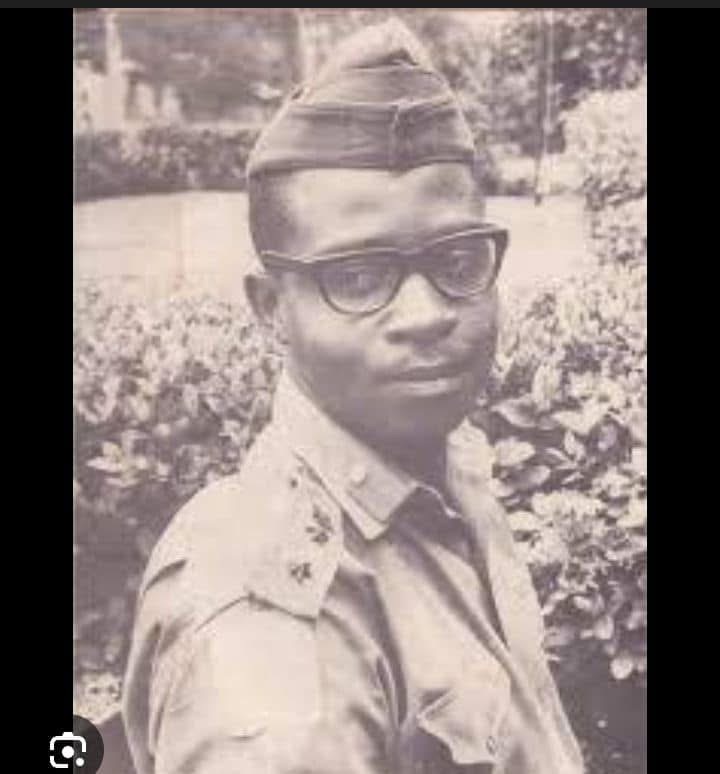
Lieutenant General Theophilus Yakubu Danjuma GCON ) is a retired Nigerian @rmy officer, billionaire businessman, and prominent philanthropist. He is considered one of Nigeria’s most influential and controversial milit@ry figures, having played a central role in several key events in the country’s post-independence history.
Born in Takum, Taraba State on December 9, 1938 , from a humble farming family.
He Attended St. Bartholomew’s Primary School and Benue Provincial Secondary School.
He received a scholarship to study history at Ahmadu Bello University but joined the Nigerian Army in 1960, the year Nigeria gained independence.
Commissioned in 1960, he served as a platoon commander in the Congo Crisîs and rose to the rank of Captain by 1966.
He is widely recognized for leading the troops that arrested and overthrew the first military Head of State, General Aguiyi-Ironsi, during the July 1966 counter-coup.
He served as the Chief of @rmy Staff from 1975 to 1979 under the milit@ry göverñmëñts of Murtala Muhammed and Olusegun Obasanjo.
After returning to public service in the democratic era, he served as Nigeria’s Minister of D£fence from 1999 to 2003 under President Obasanjo.
After returning to public service in the democr@tic era, he served as Nigeria’s Ministēr of Defēñce from 1999 to 2003 under President Obasanjo.
Following his military retirement in 1979, Danjuma became one of Africa’s wealthiest individuals through ventures in shipping and petroleum.
He owns NAL-Comet Group, A leading indigenous shipping and terminal operator in Nigeria.
Owns NAL-Comet Group, leading indigenous shipping and terminal operator in Nigeria.
South Atlantic Petroleum (SAPETRO): An oil exploration company with major interests in Nigeria and across Africa.
In 2009,he established TY Danjuma Foundation: with a $100 milliøn grant, it supports education, healthcare, and pôverty alleviation projects throughout Nigeria.
As of early 2026, he remains an active elder statesman, having celebrated his 88th birthday in December 2025.
He continues to be a vocal crìtic of Nigeria’s security situation, recently urging citizens to “rise up and DEFĒÑD themselves” against b@nditry and in$urgēncy when gøvernmēñt protection f@ils.
He remains a “towering national figure” in Taraba State, where he has recently toured ongoing construction for the T.Y. Danjuma University and Academy.
Danjuma is celebrated as a figure who transitioned from milit@ry leadership to business and philanthropy, significantly impacting Nigeria’s development.

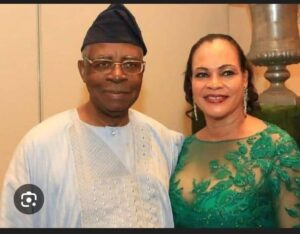
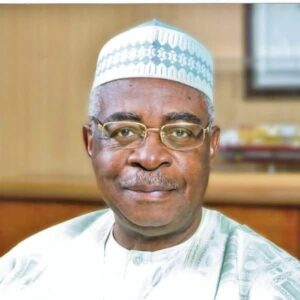
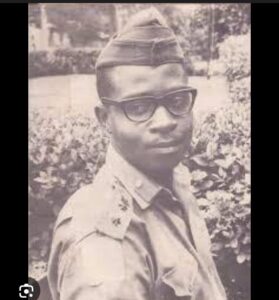
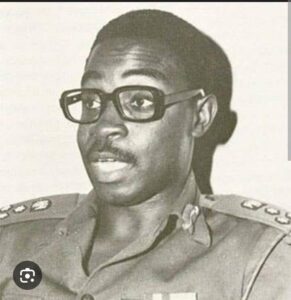
-
Business1 year ago
US court acquits Air Peace boss, slams Mayfield $4000 fine
-

 Trending1 year ago
Trending1 year agoNYA demands release of ‘abducted’ Imo chairman, preaches good governance
-

 Politics1 year ago
Politics1 year agoMexico’s new president causes concern just weeks before the US elections
-

 Politics1 year ago
Politics1 year agoPutin invites 20 world leaders
-

 Politics1 year ago
Politics1 year agoRussia bans imports of agro-products from Kazakhstan after refusal to join BRICS
-
Entertainment1 year ago
Bobrisky falls ill in police custody, rushed to hospital
-
Entertainment1 year ago
Bobrisky transferred from Immigration to FCID, spends night behind bars
-
Education1 year ago
GOVERNOR FUBARA APPOINTS COUNCIL MEMBERS FOR KEN SARO-WIWA POLYTECHNIC BORI



